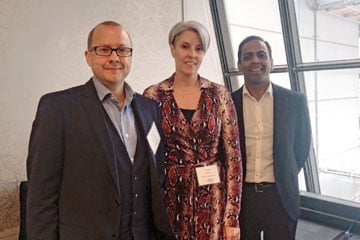
With clients expecting more price transparency, law firms need to get better at using data, experts said on Tuesday.

With clients expecting more price transparency, law firms need to get better at using data, experts said on Tuesday.
Clients can now use analytics to see through lawyers who offer discounted rates but bill higher hours, said Raj Goyle, who spoke at the Legal Marketing Association’s “Business Intelligence and Data — Working Towards a Data Supported Relationship” event on June 4.
“The annual rate increase is a huge pain point for clients,” said Goyle, co-CEO of Bodhala. Bodhala, which operates in the U.S. and some areas of Canada, uses technology to help corporate legal departments analyze and optimize their spending, the company’s website said.
“Even within the most long-standing relationships, we are hearing them say, ‘We love what you do, law firm. But we can no longer let our CFO keep asking us — without any pushback — for the data to prove you are worth this extra premium,’” said Goyle.
Firms need to start including lawyers more in business development and moving beyond the idea that customer relationship management software is the only way to go, said Michael Warren, vice president of Wilson Allen, who also spoke at the downtown Toronto event.
“The thing that’s holding firms back from being able to achieve what they are trying to achieve is how they manage their data,” said Warren. “There’s a lot of competition in this market, and clients are becoming increasingly demanding and increasingly kind of promiscuous if you like, in terms of saying ‘I can get better rates at a smaller firm; I don’t need to come to a downtown firm to get my contracts reviewed.’”
While a CRM system can be a bridge between different systems of data management, there can still be siloed data related to client intake and tracking referral sources, said Warren, who works on software and services that help law firms improve business performance. He noted that there’s no point in entering data into the system twice and technology can now help firms to avoid giving lawyers long intake checklists that don’t illustrate why the clients chose the firm.
“Law firms are complex in the way that they are structured from a relationship perspective, but they are not complex businesses when it comes to how they measure themselves. There aren’t that many things that lawyers want to know in order to work out whether they are successful or not. It’s a matter of homing in to the three or four questions they want answered,” said Warren. “Up until now, almost every project I’ve ever worked on has been [based on] ‘don’t bother the lawyers,’ which has been translated into ‘don’t involve the lawyers.’ Then when we deliver them something they don’t want or need, we all kind of throw up our hands.”
This issue of collecting consistent data across the firm — already an “enormous source of frustration” at some firms — will only become more prominent in the era of alternative fee arrangements, said Warren. He said that some firms are not measuring how clients generate profit in relation to the client’s expectations and acquisition cost — a mistake that can lead a firm into courting the wrong clients.
“In a world of flat demand and increasingly demanding clients . . . understanding how you price matters,” Warren said. “A lot of firms are struggling to get hold of the data they need to be able to do that.”
Tracey Bodnarchuk, principal at TAB Consulting Group and former chief marketing officer of Norton Rose Fulbright, said that business development teams and lawyers can both view the world as entrepreneurs and business owners that want to know how much to spend on business development and marketing.
“The way our clients are buying legal services has dramatically shifted,” said Bodnarchuk. “If you want to have a good conversation with a practice leader and talk about doing things differently, show them what they’re doing in a way that is common sense.”
Data is also an important tool to validate that gut feeling that another marketing event or sponsorship isn’t the way to build the business, said Bodnarchuk.
She pointed to events, a large area of spending that doesn’t always draw the most high-value clients for firms.
“One thing I love about working with lawyers and practitioners of law is that they are always ready for a great debate,” she said. “When you start talking about the business, the conversation changes. It’s like putting up a mirror and giving the lawyer insight they didn’t have before.”